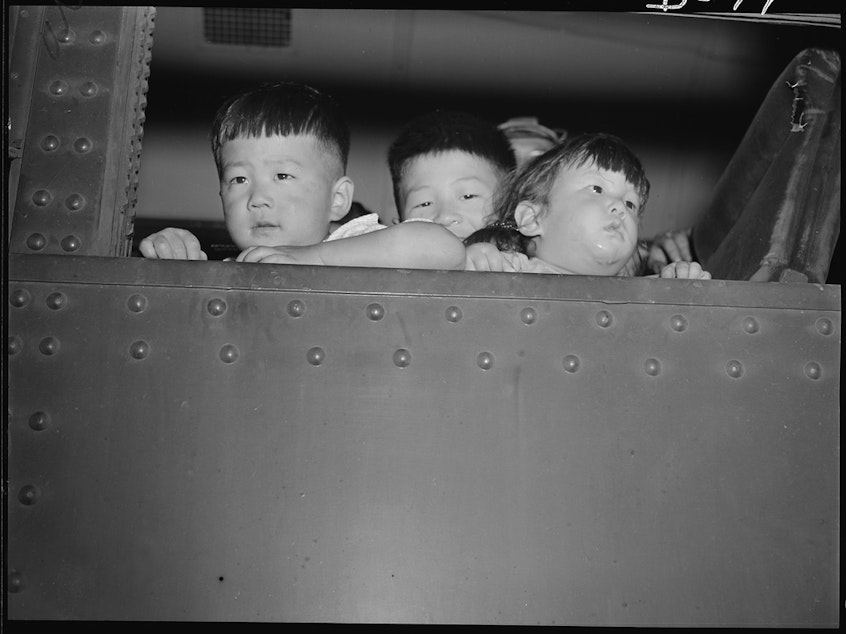Haunting symbolism: Migrant children are being held where Japanese-Americans were detained

When Tom Ikeda, a Seattle historian, learned that 1,400 migrant children will be detained this summer at Fort Sill in Oklahoma, the symbolism hit home.
Pause on that number. One thousand, four hundred kids. That’s how many students attend Ingraham High School in north Seattle.
Another number: 40,900, the number of migrant children detained in the last year. That's the number of Seattle kids in kindergarten through eighth grade.
Fort Sill was first the site from which the Indian Wars were fought.
Many years later, during World War II, it was where 700 Japanese-Americans were imprisoned, accused of being spies and traitors.
Ikeda traveled to Oklahoma to protest. It was the first time he took part of a demonstration. What follows is his interview with KUOW’s Kim Malcolm.
"F
our years ago another round of presidential campaigns started. At that point the candidate Donald Trump started describing people coming from the southern border as rapists and murderers invading our country.
There were similarities to how people were talking about Japanese during World War II – as potential terrorists and spies.
I remember raising the red flag, “Let’s be careful about this rhetoric. This will lead to bad things.”
At that point, I think people thought it was curious and made those historical connections but pretty much said, “We’re America, this is campaign rhetoric, don’t worry about it.”
And then, as we’ve watched, it’s gotten worse and worse. We’ve seen policies and now these camps, which are so similar to what we experienced as a community.
I work with Densho, and we’re the story keepers for the Japanese American community, in particular for what happened in World War II.
Nine years ago I was in Kona, Hawaii, interviewing this 80-year-old man, and he told me this very painful story. He was about 11, maybe 12 years old during World War II.
The day after Pearl Harbor, his father was picked up by the FBI. He was picked up because he was a community leader; he helped other families fill out paperwork for the Japanese consulate.
The FBI picked him up, this father of 11 children, prominent businessperson in Kona, put him in a military camp first in Hawaii, and then Fort Sill.
The son told me that his father snapped — mentally snapped — in the middle of the day.
His father ran to the fence, and started climbing it, yelling out, “I want to go home.”
The guards came out with guns and started shooting at him. As the shots were fired, the man paused and stopped toward back to the internees. At that point, one of the guards shot him in the back of his head and killed him.
As his son told me the story, I could see his face transform. You could see as he goes back to being that 11-year-old boy … the pain in his face as he talked about what it meant to him and his family to lose his father at that time.
I carry the memory of that story with me. That also made it very personal for me to go to Fort Sill to honor this man and his family.
To be there with other Japanese-Americans protesting there today was much more emotional than I expected. Yesterday there was a moment when I started crying.
My wife saw me crying and asked, “Why are you crying?” And I said, “Well, I’m thinking of the children who are being held in such inhumane conditions.”
I thought of my grandparents, my parents, the Japanese-American community, the incarceration, and all the stories I’ve collected in the past. It just hit me that what we are doing today is so similar.
The trauma our community went through, the trauma that I’ve studied, that I’ve heard through hundreds of interviews I’ve conducted … what we’re doing today will impact families, not just for decades but for generations.
When it happened to Japanese-Americans during World War II, most of the country didn’t know it was happening, and the Japanese-American community didn’t have any allies.
Today we want to be the allies that the Japanese-American community didn’t have during World War II.
Part of that is to pay attention, to learn about what is going on, and if you’re compelled as we were, you have stand up and speak.
You can’t be numb. You can’t keep being on the sidelines, thinking that someone else is going to do something.
People can make a difference, and if people speak up now, they can do that.
As a historian, I know this. I can’t just sit back and document whether we do it or not, I have to go in there and make these changes.
That’s the door I’m stepping through now. I would call on other historians to also speak up. It’s not enough for us to just watch and write about it in years to come."
This interview transcript was lightly edited for clarity. Ikeda is founding Executive Director of Densho, a Seattle-based organization that preserves and shares the history of Japanese Internment.
Listen to the interview by clicking the play button above.
Produced for the web by Isolde Raftery.





